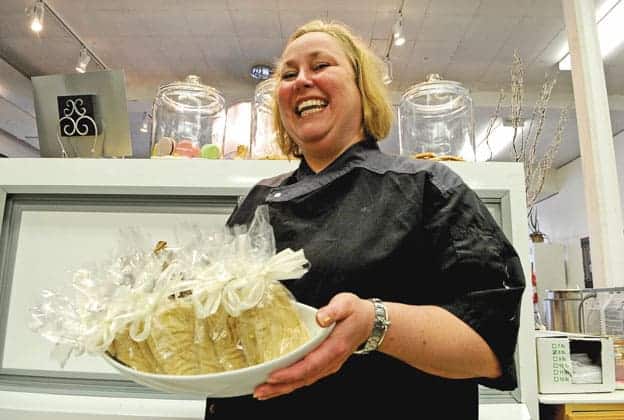
Drayton Entertainment was celebrating the present and making plans for the future on July 19, as the St. Jacobs Country Playhouse was officially re-launched after the completion of an ambitious four-year construction project.
The development, which ran concurrent with the theatre’s recent seasons, saw the building of a new tower to aid with flying stunts for more elaborate productions, made possible by a $534,000 contribution from the Building Canada fund. A $725,000 grant from the Heritage Cultural Spaces Fund paid for the purchase and installation of specialized equipment in St. Jacobs, and at the Dunfield Theatre in Cambridge.
“We never look at it as a gift or a grant, but rather an investment,” said Alex Mustakas, artistic director. “It’s an investment that transcends the theatre and positively impacts the cultural, economic, educational, and social fabric of our region.”
“We are still the only theatre company in Canada that I know of that takes no government funding for operations. So every once in a while when there is a program such as this, it was certainly nice to see our theatre company enjoy some of that funding,” said Neil Atchison, Drayton’s director of development, to an audience of local dignitaries and theatre professionals.
“We all know that communities need modern roads and bridges, but we also need cultural infrastructure to thrive,” said Peter Braid, MP for Kitchener-Waterloo. “Theatres such as this one enrich the lives of residents, attract visitors, and build a strong appreciation for the arts in people of all ages.”
In the spirit of the opening night of Drayton Theatre’s production of Spamalot, Baird took a cue from the Monty Python playbook when describing Mustakas’ application for funds. “He went to see the minister, and the conversation went something like this: ‘Well sir, I have a silly walk, and I’d like to obtain a government grant to help me develop it …’” And so on, until the familiar Python punchline: “… but I think that with government backing, I could make it very silly indeed.”
Mustakas, who also serves as director of Spamalot, took time to thank theatre employees, who have “all been involved in construction projects.”
“It really has been a balancing act to produce probably 50 or 60 shows in the last four years on top of all these major renovations, so I’m very grateful for our team,” he said.
The presentation climaxed with the announcement of a public arts fund spearheaded by Bernard Melloul, CEO of the construction company Melloul-Blamey, and administered by the K-W Community Foundation. “He wants to see community leaders immortalized for their lasting contributions to the fabric of Waterloo Region – a living history of sorts to be passed down to future generations so that we all have a whole lot better understanding of the dynamic forces that shape our own individual community,” said Atchison.
He added, “It’s a challenge to the community to invest in our past, in our present, and in our future through the development of public art. We should have art on the inside and art on the outside, all over the place.”
To kick off the call for public art, the theatre unveiled an outdoor sculpture by Wellesley-based artist Ruth Abernethy (whose work includes the famous sculptures of Oscar Peterson at the National Arts Centre and Glenn Gould at the CBC building in Toronto). Titled ‘Balancing Act,’ Atchison explained, “It features an artistic director on stilts balancing competing demands, many of which are universal to us all – family vs. work, integrity vs. responsibility, art vs. commerce.”
Further details of the RPM Public Art program are to be announced in the fall.









